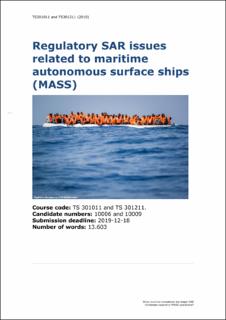Regulatory SAR issues related to maritime autonomous surface ships (MASS)
Bachelor thesis
Permanent lenke
https://hdl.handle.net/11250/2656813Utgivelsesdato
2019Metadata
Vis full innførselSamlinger
Sammendrag
Følgende bacheloroppgave tar for seg de potensielle rettslige og etiske SAR-utfordringene som kan oppstå ved innføring av autonome skip. Prinsippet med å ha sjøfolk ombord har vært sentralt i etableringen av det juridiske maritime rammeverket. De maritime konvensjonene SOLAS og UNCLOS har presise SAR-formuleringer der autonome skip må redegjøres for. Tolkninger, definisjoner og unntak som potensielt kan skape utfordringer vil bli analysert og diskutert i oppgaven.
Forskningsspørsmålet har blitt definert som “Hva kan betraktes som de viktigste SAR-utfordringene i forbindelse med autonome skip?”. Problemstillingen blir utforsket gjennom en kvalitativ studie basert på intervjuer med et ekspertpanel av fremtredende personer i den maritime næringen. Relevant teori har bidratt til å begrense omfanget av oppgaven ved å tidlig etablere de relevante emnene.
Ved å sammenligne intervjuene, var det alt fra enstemmighet, til dype moralske uenigheter. Hovedfunnene omfattet utfordringer både på juridisk og etisk grunnlag. Det ble tydelig at dagens SAR-lovverk bør omarbeides fra grunnen for å tjene sitt formål med hensyn til autonome skip. Hovedutfordringen som ble avdekket, var imidlertid det tilsynelatende gapet mellom de moralske forventninger til et skips bidrag i redningsoperasjoner. The following bachelor thesis addresses the potential judicial and ethical SAR challenges that could occur with the introduction of autonomous ships. The principle of having seafarers onboard has been central in the creation of the legal framework. The maritime conventions of SOLAS and UNCLOS have precise SAR phrasings in which autonomous ships needs to be accounted for. Interpretations, definitions and exemptions that could potentially create challenges will be analysed and discussed.
The research question “What could be considered the major SAR challenges regarding MASS operations?” will be explored through a qualitative study based on interviews with an expert panel of prominent figures in the maritime industry. The relevant theory will be collected through a literature review of judicial publications on MASS which helped to limit the scope of the thesis by establishing relevant topics for an interview guide.By comparing the answers obtained through the interviews, there were both unanimous agreement and deeply imbedded moral discrepancies.
The main findings included challenges of both legal and ethical concerns. It quickly became evident that the SAR regulations of today will have to be reworked from its core in order to serve its purpose. However, the main challenge uncovered was the apparent gap in moral expectations of assisting in SAR between a master mariner and the shore-based interviewees.
